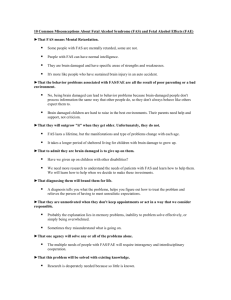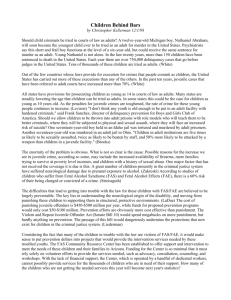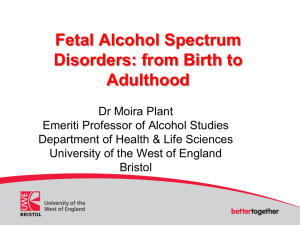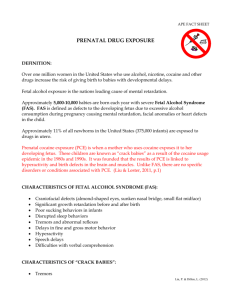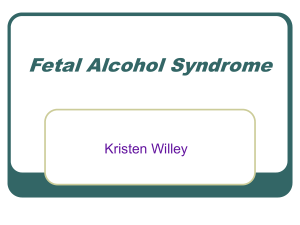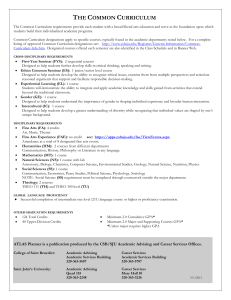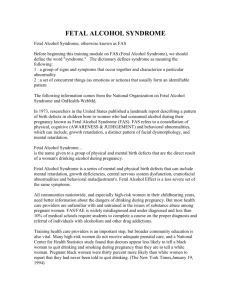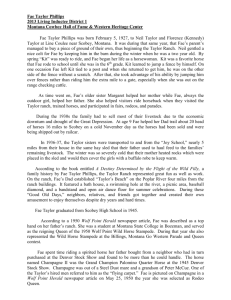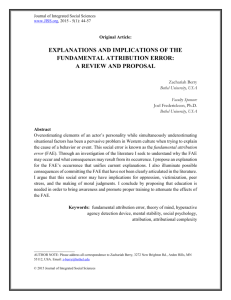Fetal Alcohol Problems - Redemption Psychiatry
advertisement
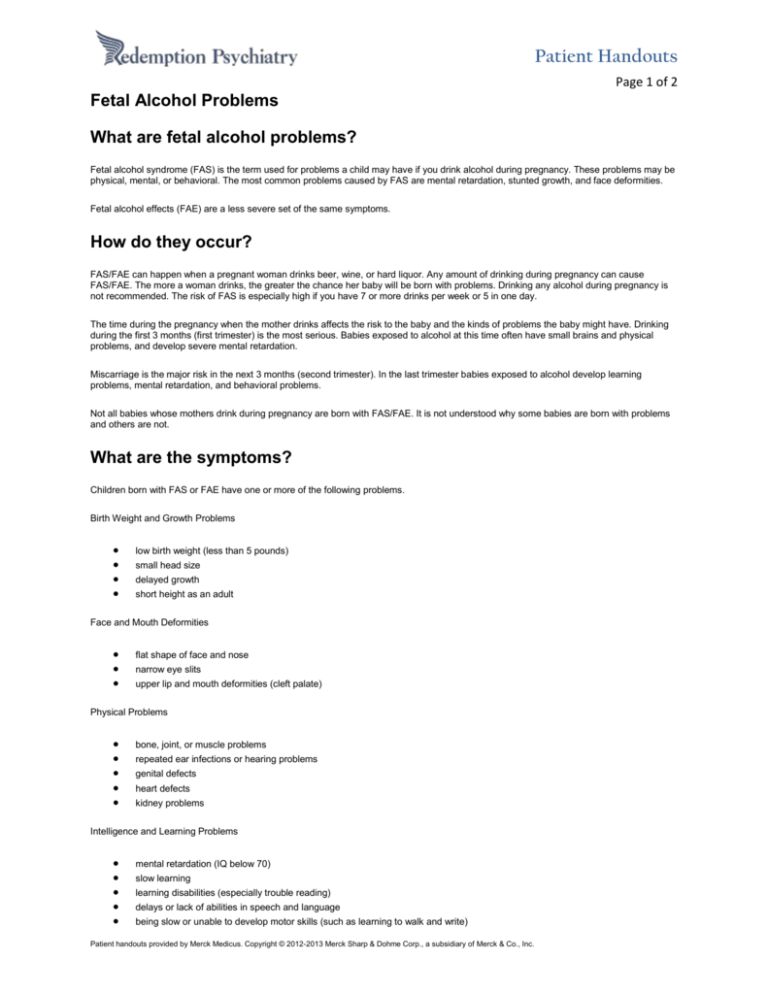
Patient Handouts Page 1 of 2 Fetal Alcohol Problems What are fetal alcohol problems? Fetal alcohol syndrome (FAS) is the term used for problems a child may have if you drink alcohol during pregnancy. These problems may be physical, mental, or behavioral. The most common problems caused by FAS are mental retardation, stunted growth, and face deformities. Fetal alcohol effects (FAE) are a less severe set of the same symptoms. How do they occur? FAS/FAE can happen when a pregnant woman drinks beer, wine, or hard liquor. Any amount of drinking during pregnancy can cause FAS/FAE. The more a woman drinks, the greater the chance her baby will be born with problems. Drinking any alcohol during pregnancy is not recommended. The risk of FAS is especially high if you have 7 or more drinks per week or 5 in one day. The time during the pregnancy when the mother drinks affects the risk to the baby and the kinds of problems the baby might have. Drinking during the first 3 months (first trimester) is the most serious. Babies exposed to alcohol at this time often have small brains and physical problems, and develop severe mental retardation. Miscarriage is the major risk in the next 3 months (second trimester). In the last trimester babies exposed to alcohol develop learning problems, mental retardation, and behavioral problems. Not all babies whose mothers drink during pregnancy are born with FAS/FAE. It is not understood why some babies are born with problems and others are not. What are the symptoms? Children born with FAS or FAE have one or more of the following problems. Birth Weight and Growth Problems low birth weight (less than 5 pounds) small head size delayed growth short height as an adult Face and Mouth Deformities flat shape of face and nose narrow eye slits upper lip and mouth deformities (cleft palate) Physical Problems bone, joint, or muscle problems repeated ear infections or hearing problems genital defects heart defects kidney problems Intelligence and Learning Problems mental retardation (IQ below 70) slow learning learning disabilities (especially trouble reading) delays or lack of abilities in speech and language being slow or unable to develop motor skills (such as learning to walk and write) Patient handouts provided by Merck Medicus. Copyright © 2012-2013 Merck Sharp & Dohme Corp., a subsidiary of Merck & Co., Inc. Patient Handouts Page 2 of 2 Behavioral Problems and Mental Illness short attention span or hyperactivity (attention deficit/hyperactivity disorder) depression psychosis (hallucinations and delusions) aggressive and defiant behavior (oppositional defiant and conduct disorders) drug and alcohol abuse Many children with FAS/FAE have behavior problems in school. More than a third of children with FAS develop drug and alcohol problems by adolescence and the young adult years. As people with FAS/FAE get older, they have high rates of psychological problems. Many have anger control problems and may be violent. They are at high risk for getting into trouble with the law. How are they diagnosed? A healthcare provider can diagnose FAS/FAE by: reviewing prenatal and birth history giving a physical exam testing abilities to understand, communicate, move, and adapt measuring facial features How is it treated? There is no cure for FAS or FAE. Certain problems caused by FAS or FAE can be helped with treatment. For example, heart problems can often be helped by surgery. Plastic surgery can help correct severe face deformities. For mental retardation and learning disabilities, special education classes in school can help. All public schools in the United States offer special classes for retarded and learning disabled students between the ages of 3 and 19. For children and adults with behavior problems and psychological difficulties, treating the specific problem helps. For example, seeing a mental health therapist can help children and adults deal with depression, learning disabilities, aggression, or anger. How long will the effects last? The effects of FAS/FAE last throughout the child's life. A baby with FAS/FAE may be irritable, nervous, and very sensitive to sound and light, and may cry often. The problems change as the child grows up. Problems with aggressive behavior, depression, psychosis, and substance abuse commonly start in the teenage years. What can I do to help myself or my loved one? FAS/FAE can only be prevented by not drinking during pregnancy or when trying to get pregnant. If you suspect that a baby or child has FAS/FAE, or any of the problems listed above, get professional help. Children with FAS/FAE need early diagnosis and medical treatment. If you know a woman who is pregnant and drinking, talk with her about stopping drinking. If she has a problem with repeated drinking, a medical or mental health professional may be able to help her quit. For more information, contact: National Organization on Fetal Alcohol Syndrome (NOFAS) 1815 H Street, Suite 1000 Washington, DC 20007 Tel: (202) 785-4585 Patient handouts provided by Merck Medicus. Copyright © 2012-2013 Merck Sharp & Dohme Corp., a subsidiary of Merck & Co., Inc.
